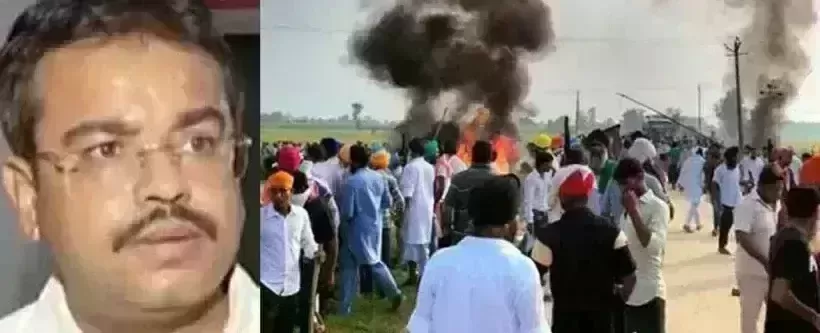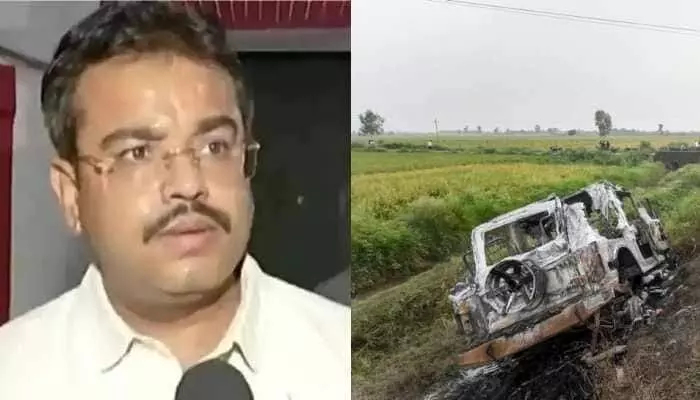
Supreme Court reverses denial of justice
text_fieldsAshish Mishra
The Supreme Court on Monday set aside the bail granted to Ashish Mishra, the prime accused in the killing four farmers and a journalist while a vehicle rammed on them on October 3 last year in Lakhimpur Kheri, Uttar Pradesh. The bench comprising Chief Justice NV Ramana, Justice Suryakant and Justice Hima Kohli has asked Ashish, who is the son of Central minister Ajay Mishra within a week. The court's ruling came on the special petition filed by the families of the slain farmers. The apex court also referred the matter to the High Court to consider whether Mishra could be granted bail or not, after hearing the victims. The charge against Ashish Mishra is that during the farmers' agitation in Lakhimpur Kheri, the minister's son and his accomplices came in three SUVs, ran over the people and killed five. Farmers became violent following the incident and the minister's driver and two BJP activists were also killed. In the light of several complaints received in the Lakhimpur incident, the Supreme Court had on November 17, 2021 appointed suo motu a Special Investigation Team (SIT) to take up the case. It also appointed former judge of the Punjab and Haryana High Court Justice Rakesh Kumar to oversee the process. In the meantime, the Lucknow bench of the Allahabad High Court on February 10 granted bail to Ashish. The High Court held that Ashish was accused of instructing the driver to drive the vehicle and that the driver and two passengers were also killed. The court ruled that these murders could not be ignored and there was a chance of the driver accelerating the vehicle in self-defence. However, the relatives of the slain farmers had approached the Supreme Court with a complaint that they were not heard during the case. They said that they could not attend the online hearing due to technical issues and requested the court to hear their arguments again but the High Court did not grant it.
In the judgement revoking the bail granted to the Minister's son, the apex court bench has strongly criticized the denial of justice in the democratic system and directed that equal treatment be given to all in the administration of justice. The apex court has directed the lower court itself to reconsider the verdict and rectify it. The observations made by the Supreme Court criticizing the High Court's decision to grant bail to the accused point to the scars in our judicial system. The bench held that the lower court, which banked on the FIR while the chargesheet was pending, had acted in undue haste and violated the norms by considering irrelevant matters. The court noted that the FIR should not be treated as an encyclopedia and in the case in question, the basic right that victims should be heard was breached throughout the case. The farmers' agitation was against the anti-farmer policies of the BJP-led central government. BJP activists had come out with unnecessary provocations to break up the peasant struggle as they had done in the case of citizenship agitation. The same thing happened in Lakhimpur Kheri. The provocation there was spearheaded by the Union Minister's son Ashish. Eight people lost their lives in the incident. However, there was a widespread perception that Ashish's ministerial connection and the BJP's position as the ruling party both at the Centre and the state would provide him a shield. From the beginning, the state government and BJP leaders tried to wash the minister's son's hand off the guilt. Even his eventual arrest came after considerable dithering when it became certain that the farmers would not budge. Even in jail and in the case, he was given top VIP treatment.
It was hoped that during the hearing of the case on April 4, the UP government would take a stand against Ashish's bail. But the Yogi government would not do that. Their position was that by a mere grant of bail, the accused would not escape and there was no threat of his influencing witnesses. The Yogi government argued that the observations to the contrary made by the Supreme Court-appointed SIT were baseless prejudices. This alone is sufficient for any one to infer the course of the case. And it was realising this that the Supreme Court took the matter seriously and cancelled the bail and sent it back for a retrial. The verdict of the Supreme Court is a heavy blow to the arrogance backed by power and the use of clout of political establishment. This verdict is sure to inspire ordinary people, who are suppressed and whose voices get silenced by the atrocities of fascist parties and regimes that do not tolerate anyone other than themselves; it is sure enable the common people regain their faith in the rule of law and boost their morale to take up legal action.

























